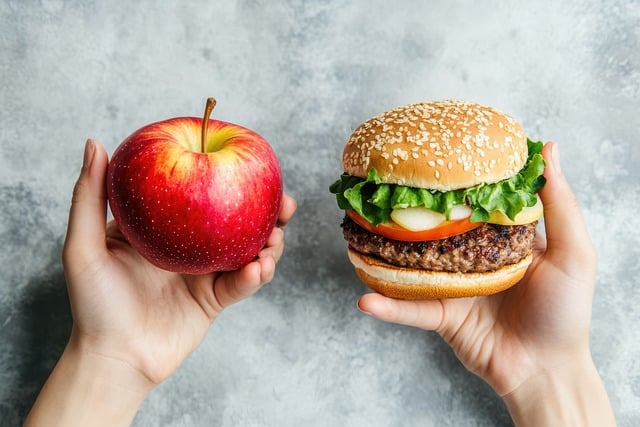-By: Bhavisha Changrani
In today’s fast-paced world, convenience often trumps careful consideration when it comes to food choices. This has led to a dramatic increase in the consumption of ultra-processed foods (UPFs), which are now a dominant part of many modern diets. While these foods offer ease and often aggressive marketing, a growing body of scientific evidence reveals a disturbing link between high UPF intake and a significantly increased risk of chronic diseases, including obesity, type 2 diabetes, and cardiovascular disease.

What are Ultra-Processed Foods?
Unlike minimally processed foods like fruits, vegetables, and whole grains, UPFs undergo multiple industrial processes. They contain numerous additives, such as artificial colors, flavors, sweeteners, emulsifiers, and preservatives, that are not typically used in home cooking. Examples include:
Sugary drinks
Packaged snacks (chips, cookies, candies)
Processed meats (deli meats,hot dogs, sausages)
Instant noodles and soups
Ready-to-eat meals
Breakfast cereals (especially sugary varieties)
These foods are often high in added sugar, salt, and unhealthy fats, while being low in essential nutrients like vitamins, minerals, and fiber.

The Link to Obesity
The high energy density, palatability, and aggressive marketing of UPFs contribute significantly to overconsumption and weight gain. These foods are designed to be hyper-palatable, stimulating reward centers in the brain and making it difficult to regulate intake. Moreover, their low fiber content and rapid digestion lead to less satiety, prompting people to eat more frequently. Studies have consistently shown a strong association between UPF consumption and increased body weight, higher body mass index (BMI), and a greater risk of obesity.
The Connection to Type 2 Diabetes
Excessive consumption of UPFs has been directly linked to an increased risk of developing type 2 diabetes. The high sugar content of many UPFs leads to rapid spikes in blood glucose levels, placing a significant strain on the body’s insulin response. Over time, this can lead to insulin resistance, a hallmark of type 2 diabetes. Furthermore, the low fiber content of UPFs contributes to poor blood sugar control. Several large-scale studies have demonstrated a clear correlation between higher UPF intake and a greater incidence of type 2 diabetes.

The Impact on Cardiovascular Health
UPFs also pose a significant threat to cardiovascular health. Their high content of saturated and trans fats, sodium, and added sugars contributes to several risk factors for heart disease, including:
Elevated blood pressure
Increased levels of harmful cholesterol (LDL)
Inflammation
Impaired blood vessel function
Regular consumption of UPFs has been linked to an increased risk of heart attacks, strokes, and other cardiovascular events.
The Mechanisms at Play
Several mechanisms are thought to contribute to the detrimental effects of UPFs on health:
Disruption of the gut microbiome
The artificial additives and low fiber content of UPFs can negatively impact the balance of bacteria in the gut, leading to inflammation and metabolic dysfunction.
Increased inflammation
Chronic low-grade inflammation is a key factor in the development of many chronic diseases, and UPF consumption has been shown to promote inflammatory processes in the body.
Displacement of nutrient-rich foods
High intake of UPFs often displaces the consumption of healthier, minimally processed foods that provide essential nutrients and protective compounds.
What Can We Do?

Reducing UPF consumption is crucial for protecting our health. Here are some concrete steps:
focus on whole, unprocessed foods: Prioritize fruits, vegetables, whole grains, lean proteins, and healthy fats.
Read food labels carefully
Pay attention to the ingredient list and look for foods with minimal additives and short ingredient lists.
Cook more meals at home
This gives you greater control over the ingredients and allows you to avoid processed foods.
Limit consumption of sugary drinks, processed meats, and packaged snacks.
Be aware of marketing tactics
UPFs are often heavily marketed, so be mindful of advertising and make informed choices.

Conclusion
By making conscious food choices and reducing our reliance on ultra-processed foods, we can significantly reduce our risk of developing chronic diseases and improve our overall health and well-being.













